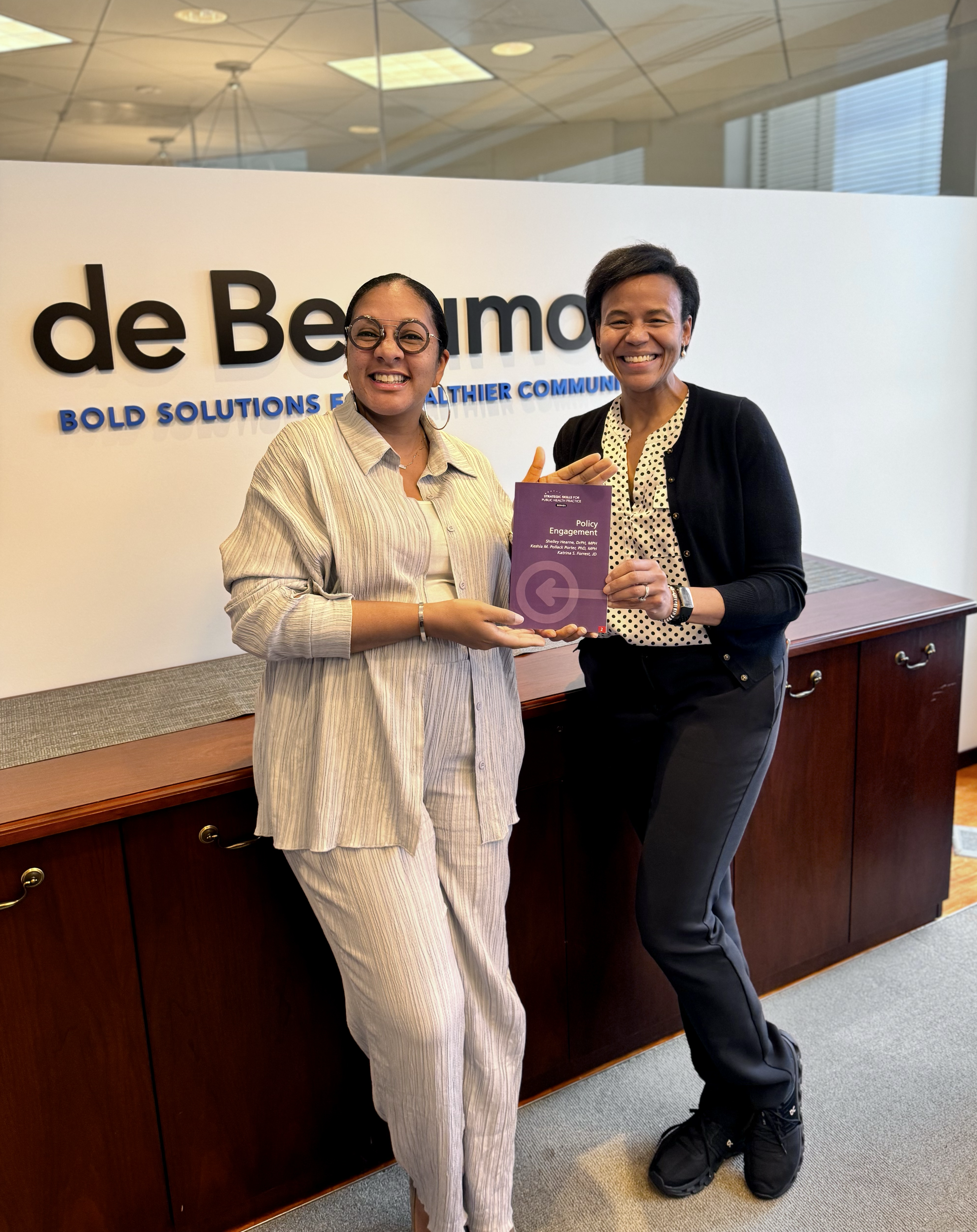
Katrina Forrest and Keshia Pollack Porter pose with a copy of their book, Strategic Skills for Public Health Practice: Policy Engagement. The book demystifies policymaking to help public health professionals become engaged, energized, and effective advocates for policies that drive better health.
The de Beaumont Foundation’s Speaker Series highlights leaders in public health practice, advocacy, policymaking, and other related fields.
From transportation to education to business, policymaking across sectors has major implications for public health. But too often, public health professionals are left out of critical policy decisions that affect the safety, wellness, and longevity of people in communities.
Keshia Pollack Porter, PhD, works to incorporate public health perspectives through a Health in All Policies (HiAP) lens. This approach fosters collaboration across sectors to assess the health and equity implications of policies and initiatives.
“We really need to lean into policy change to address some of the most pressing problems in this country,” said Pollack Porter, Bloomberg Centennial Chair and professor in the Department of Health Policy and Management at the Johns Hopkins Bloomberg School of Public Health, in a presentation with de Beaumont staff earlier this year.
She posed a question to the staff: “How do we help to promote consideration of health and evidence during the policy process, particularly in decisions that are not squarely in public health?”
In addition to more conventional means of policy engagement, such as filing amicus briefs, court monitoring, lobbying, providing expert testimony, and voting on behalf of public health, a range of evidence-based tactics can help to advance HiAP.
One such tool is the health impact assessment (HIA), which is used to explore the health implications of a proposed initiative or policy. “I have found in my work that the HIA has been able to help people understand how health connects to other sectors, and ultimately, we’ve seen ways to promote efficiency and to look at the short- and long-term health benefits and risks,” Pollack Porter said.
Her experience with HIAs led Pollack Porter to consider other ways to bring public health into decision-making processes. Inspired by fiscal notes used by states to assess the financial impacts of bills or resolutions, she worked with the Health Impact Project to pilot legislative health notes across diverse U.S. states and localities. These notes boil down various evidence and data to help policymakers understand the potential effects of proposed legislation on health outcomes.
Pollack Porter highlighted the ease and accessibility that legislative health notes provided legislative and policy leaders. “People thought that the level of detail in the analysis was helpful,” she said. “They appreciated the evidence because a lot of staffers for legislators don’t have public health expertise and don’t know how to search the literature and synthesize it.”
The success of legislative health notes spurred Pollack Porter to pursue other means of policy engagement, with support from the Bloomberg American Health Initiative to develop, apply, and test health notes for judicial decisions. Evaluating health impacts through judicial health notes “acknowledges that judicial rulings can have profound consequences for health inequity,” she said.
Pollack Porter explained the importance of considering the health implications of high-profile U.S. Supreme Court decisions in recent years. While the health consequences of overturning Roe v. Wade, for example, are clear, other decisions can also widen health inequities. She pointed to the health implications of effectively ending race-based admissions in higher education, which for public health could lead to a less diverse workforce that does not represent the communities it serves.
“What does this mean for us who care about health equity and training the next generation if we’re saying that we’re not focusing on or thinking about race?” Pollack Porter asked. These kinds of considerations speak to the need for greater public health representation in judicial decisions.
“We can’t have this conversation without thinking about the politics of it all,” she said. “I have colleagues who say, ‘Oh, I do policy, but I don’t do politics.’ You can’t separate the two in my mind. They’re so intertwined.” Pollack Porter challenged staff to rethink the role of courts as they relate to public health, noting, “You may say that courts make decisions, but they make policy as well.”
Keshia Pollack Porter is the co-author of Strategic Skills for Public Health Practice: Policy Engagement, an introduction to policy advocacy and decision-making strategies for informing and influencing policymakers. Pollack Porter and Policy Engagement co-authors Shelley Hearne and Katrina Forrest also discuss tools for equity-centered policy in a column for the Journal of Public Health Management and Practice.




